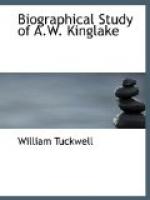The popularity of “Eothen” is a paradox: it fascinates by violating all the rules which convention assigns to viatic narrative. It traverses the most affecting regions of the world, and describes no one of them: the Troad—and we get only his childish raptures over Pope’s “Homer’s Iliad”; Stamboul—and he recounts the murderous services rendered by the Golden Horn to the Assassin whose serail, palace, council chamber, it washes; Cairo— but the Plague shuts out all other thoughts; Jerusalem—but Pilgrims have vulgarized the Holy Sepulchre into a Bartholomew Fair. He gives us everywhere, not history, antiquities, geography, description, statistics, but only Kinglake, only his own sensations, thoughts, experiences. We are told not what the desert looks like, but what journeying in the desert feels like. From morn till eve you sit aloft upon your voyaging camel; the risen sun, still lenient on your left, mounts vertical and dominant; you shroud head and face in silk, your skin glows, shoulders ache, Arabs moan, and still moves on the sighing camel with his disjointed awkward dual swing, till the sun once more descending touches you on the right, your veil is thrown aside, your tent is pitched, books, maps, cloaks, toilet luxuries, litter your spread-out rugs, you feast on scorching toast and “fragrant” {10} tea, sleep sound and long; then again the tent is drawn, the comforts packed, civilization retires from the spot she had for a single night annexed, and the Genius of the Desert stalks in.
Herein, in these subjective chatty confidences, is part of the spell he lays upon us: while we read we are in the East: other books, as Warburton says, tell us about the East, this is the East itself. And yet in his company we are always Englishmen in the East: behind Servian, Egyptian, Syrian, desert realities, is a background of English scenery, faint and unobtrusive yet persistent and horizoning. In the Danubian forest we talk of past school-days. The Balkan plain suggests an English park, its trees planted as if to shut out “some infernal fellow creature in the shape of a new-made squire”; Jordan recalls the Thames; the Galilean Lake, Windermere; the Via Dolorosa, Bond Street; the fresh toast of the desert bivouac, an Eton breakfast; the hungry questing jackals are the place-hunters of Bridgewater and Taunton; the Damascus gardens, a neglected English manor from which the “family” has been long abroad; in the fierce, dry desert air are heard the “Marlen” bells of home, calling to morning prayer the prim congregation in far-off St. Mary’s parish. And a not less potent factor in the charm is the magician’s self who wields it, shown through each passing environment of the narrative; the shy, haughty, imperious Solitary, “a sort of Byron in the desert,” of cultured mind and eloquent speech, headstrong and not always amiable, hiding sentiment with cynicism, yet therefore irresistible all the more when he condescends to endear himself by his




